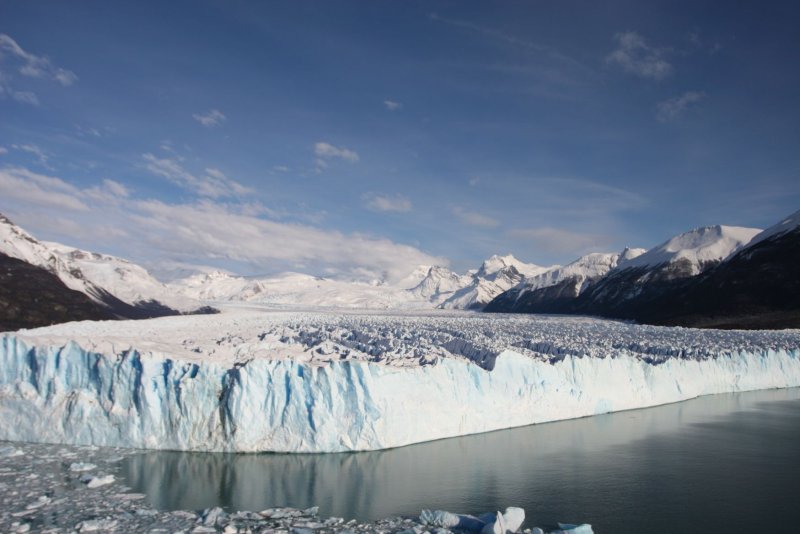World
Perito Moreno Glacier Faces Irreversible Retreat, Study Finds

Argentina’s renowned Perito Moreno Glacier, a key attraction in Patagonia, is undergoing a rapid and irreversible retreat, according to a new study. For years, this massive ice formation had been a rare stable entity in a region where most glaciers were shrinking. It has captivated visitors with its towering ice wall over Lake Argentino and dramatic ice ruptures, drawing large crowds from the nearby town of El Calafate. However, findings published in Communications Earth & Environment have raised significant concerns.
Researchers from Germany and Argentina report that the glacier has been in a state of accelerated retreat since 2019. This follows a period of relative stability that lasted nearly two decades. Between 2000 and 2018, the glacier thinned at a rate of approximately 1 foot per year. In stark contrast, the rate surged to 18 feet annually from 2019 to 2024. In some sections, the glacier has receded by over 2,600 feet in just five years.
Located in Los Glaciares National Park, the Perito Moreno Glacier covers an area of nearly 97 square miles, equivalent to about one and a half times the size of Washington, D.C. Since 2018, it has lost around 0.7 square miles, which is comparable to approximately 320 soccer fields. Recognized as a UNESCO World Heritage Site since 1981, the glacier is one of the few in the world that is easily accessible by land. This accessibility, along with its spectacular ice ruptures and the surrounding infrastructure, has made it a significant tourist destination.
The recent study utilized a combination of satellite data, airborne radar surveys, and sonar measurements from the lake to assess the glacier’s condition. Alarmingly, it revealed that Perito Moreno is losing contact with a subglacial ridge, a feature that has historically provided stability to the ice mass. Should this separation continue, experts warn that the glacier could collapse and retreat several miles, driven by accumulating water beneath the ice.
From a tourism perspective, this shift may lead to more frequent ice ruptures, but the reality of the situation casts a shadow over these events. Visitors may witness spectacular icefalls that, while visually stunning, are now tinged with the understanding that they could soon be a thing of the past.
Scientists attribute the glacier’s retreat to a “delayed response to climate change,” the outcome of decades of warmer temperatures and reduced snowfall. In the past thirty years, average summer temperatures in the area have increased by 2.2 degrees Fahrenheit. Notably, the 2023-24 summer marked the warmest period recorded in three decades, with temperatures reaching 52°F.
The glacier’s decline is part of a broader trend observed in the region. In 1850, Los Glaciares National Park housed around 150 active glaciers. By 2015, this number had dwindled to just 26, highlighting the urgent need for awareness and action regarding climate change and its effects on these vital natural resources.
As the situation evolves, the future of Perito Moreno Glacier hangs in the balance, underscoring the complex interplay between tourism, climate, and environmental sustainability.
-

 Lifestyle4 months ago
Lifestyle4 months agoLibraries Challenge Rising E-Book Costs Amid Growing Demand
-

 Sports3 months ago
Sports3 months agoTyreek Hill Responds to Tua Tagovailoa’s Comments on Team Dynamics
-

 Sports3 months ago
Sports3 months agoLiverpool Secures Agreement to Sign Young Striker Will Wright
-

 Lifestyle3 months ago
Lifestyle3 months agoSave Your Split Tomatoes: Expert Tips for Gardeners
-

 Lifestyle3 months ago
Lifestyle3 months agoPrincess Beatrice’s Daughter Athena Joins Siblings at London Parade
-

 World3 months ago
World3 months agoWinter Storms Lash New South Wales with Snow, Flood Risks
-

 Science4 months ago
Science4 months agoTrump Administration Moves to Repeal Key Climate Regulation
-

 Science3 months ago
Science3 months agoSan Francisco Hosts Unique Contest to Identify “Performative Males”
-

 Business4 months ago
Business4 months agoSoFi Technologies Shares Slip 2% Following Insider Stock Sale
-

 Science4 months ago
Science4 months agoNew Tool Reveals Link Between Horse Coat Condition and Parasites
-

 Sports3 months ago
Sports3 months agoElon Musk Sculpture Travels From Utah to Yosemite National Park
-

 Science4 months ago
Science4 months agoNew Study Confirms Humans Transported Stonehenge Bluestones








